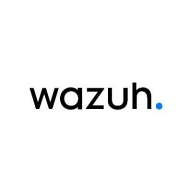

Logz.io and Wazuh are competing products in the monitoring and security analytics category. Logz.io appears to have an advantage due to higher customer support satisfaction and pricing benefits, while Wazuh is noted for its robust features.
Features: Logz.io is known for scalable log management and real-time analytics, with integrations for popular development tools. Wazuh focuses on comprehensive security monitoring, threat detection, and flexibility offered by its open-source approach, appealing to security-focused organizations.
Room for Improvement: Logz.io could improve by enhancing its open-source capabilities and expanding its user-accessible customization tools. It may also benefit from a wider set of security-focused features. Customer documentation can be made more user-friendly. Wazuh can work on simplifying its initial setup process. Enhancing the user interface for smoother navigation and adjusting integrations to support a wider range of tools would also help improve its deployment experience.
Ease of Deployment and Customer Service: Logz.io offers a streamlined deployment with extensive documentation and reliable customer support that enhances the implementation experience. Wazuh provides a self-managed option that offers flexibility but may require more technical expertise during setup. Customer service for Logz.io is generally more responsive, simplifying troubleshooting, while Wazuh's support could improve in responsiveness.
Pricing and ROI: Logz.io requires higher upfront costs but delivers quicker ROI due to its efficient implementation and monitoring capabilities. Its monthly billing model allows for cost adjustments based on usage patterns. Wazuh offers a more budget-friendly entry point through its open-source model, which is beneficial for organizations with technical expertise, though achieving optimal ROI may take longer.
I have seen value in security cost savings with Wazuh, as using proprietary EDR versions could save us substantial money.
They responded quickly, which was crucial as I was on a time constraint.
We use the open-source version of Wazuh, which does not provide paid support.
The documentation is good and provides clear instructions, though it's targeted at those with technical backgrounds.
It can accommodate thousands of endpoints on one instance, and multiple instances can run for different clients.
Currently, I don't see any limitations in terms of scalability as Wazuh can still connect many endpoints.
Scalability depends on the configuration and the infrastructure resources like compute and memory we allocate.
The stability of Wazuh is strong, with no issues stemming from the solution itself.
The stability of Wazuh is largely dependent on maintenance.
The indexer frequently times out, requiring system restarts.
Machine learning is needed along with understanding user behavior and behavioral patterns.
The integration modules are insufficiently developed, necessitating the creation of custom integration solutions using tools like Logstash and PubSub.
I think Wazuh should improve by introducing AI functionalities, as it would be beneficial to see AI incorporated in the threat hunting and detection functionalities.
Wazuh is completely free of charge.
I would definitely recommend Wazuh, especially considering Fortinet's licensing model which is confusing and overpriced in my opinion.
Totaling around two lakh Indian rupees per month.
Wazuh is a SIEM tool that is highly customizable and versatile.
The system allows us to monitor endpoints effectively and collect security data that can be utilized across other platforms such as SOAR.
With this open source tool, organizations can establish their own customized setup.
| Product | Market Share (%) |
|---|---|
| Wazuh | 6.4% |
| Logz.io | 0.7% |
| Other | 92.9% |

| Company Size | Count |
|---|---|
| Small Business | 3 |
| Midsize Enterprise | 1 |
| Large Enterprise | 7 |
| Company Size | Count |
|---|---|
| Small Business | 27 |
| Midsize Enterprise | 15 |
| Large Enterprise | 8 |
Logz.io is a leading cloud-native observability platform that enables engineers to use the best open source tools in the market without the complexity of operating, managing, and scaling them. Logz.io offers four products: Log Management built on ELK, Infrastructure Monitoring based on Prometheus, Distributed Tracing based on Jaeger, and an ELK-based Cloud SIEM. These are offered as fully managed, integrated cloud services designed to help engineers monitor, troubleshoot and secure their distributed cloud workloads more effectively. Engineering driven companies like Siemens, Unity and ZipRecruiter use Logz.io to simplify monitoring and security workflows, increasing developer productivity, reducing time to resolve issues, and increasing the performance and security of their mission-critical applications.
Wazuh offers an open-source platform designed for seamless integration into diverse environments, making it ideal for enhancing security infrastructure. Its features include log monitoring, compliance support, and real-time threat detection, providing effective cybersecurity management.
Wazuh stands out for its ability to integrate easily with Kubernetes, cloud-native infrastructures, and various SIEM platforms like ELK. It features robust MITRE ATT&CK correlation, comprehensive log monitoring capabilities, and detailed reporting dashboards. Users benefit from its file integrity monitoring and endpoint detection and response (EDR) capabilities, which streamline compliance and vulnerability assessments. While appreciated for its customization and easy deployment, room for improvement exists in scalability, particularly in the free version, and in areas such as threat intelligence integration, cloud integration, and container security. The platform is acknowledged for its strong documentation and technical support.
What are the key features of Wazuh?In industries like finance, healthcare, and technology, Wazuh is utilized for its capabilities in log aggregation, threat detection, and vulnerability management. Companies often implement its features to ensure compliance with stringent regulations and to enhance security practices across cloud environments. By leveraging its integration capabilities, organizations can achieve unified security management, ensuring comprehensive protection of their digital assets.
We monitor all Security Information and Event Management (SIEM) reviews to prevent fraudulent reviews and keep review quality high. We do not post reviews by company employees or direct competitors. We validate each review for authenticity via cross-reference with LinkedIn, and personal follow-up with the reviewer when necessary.